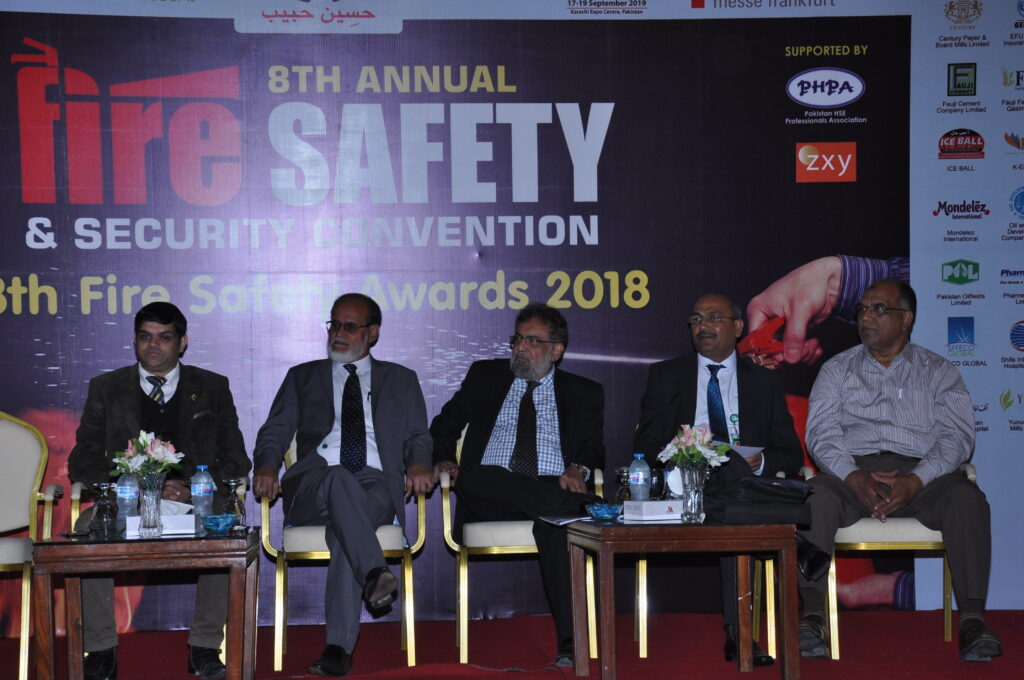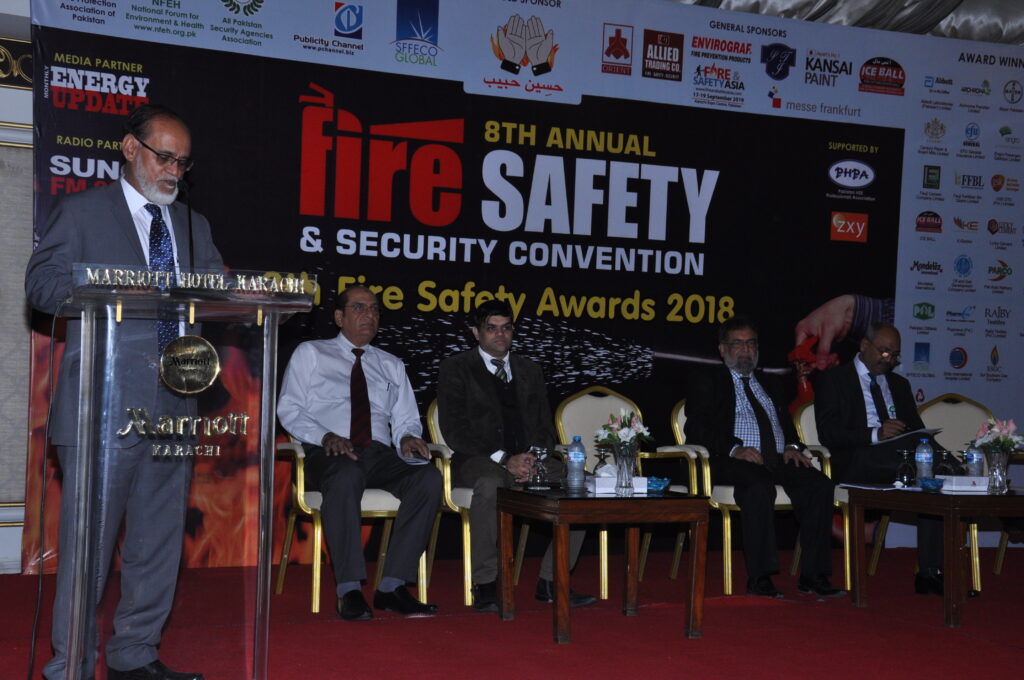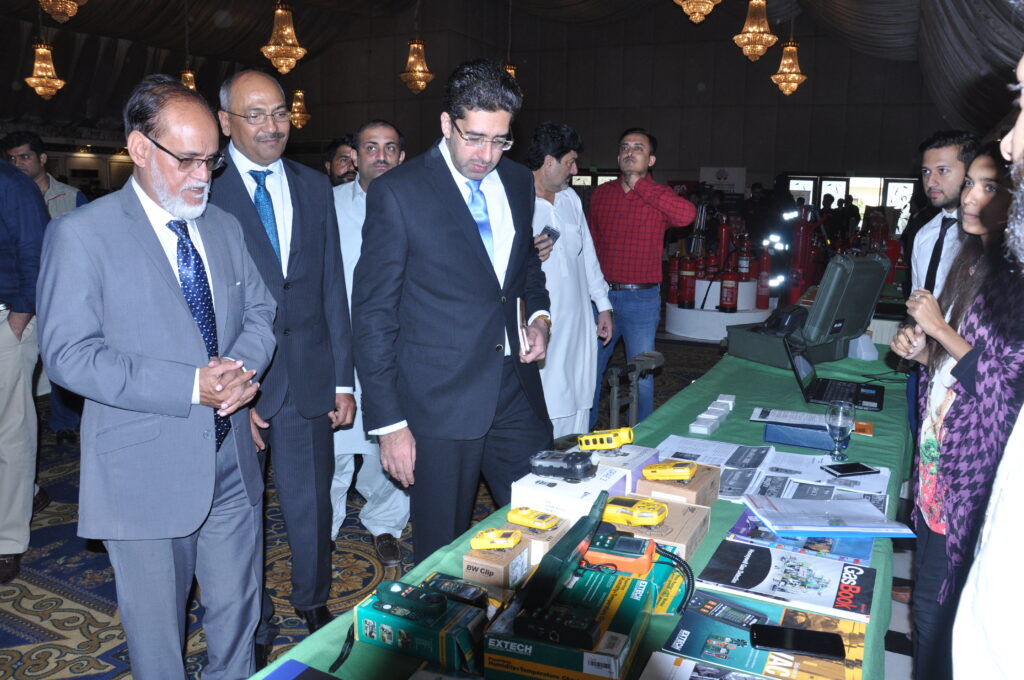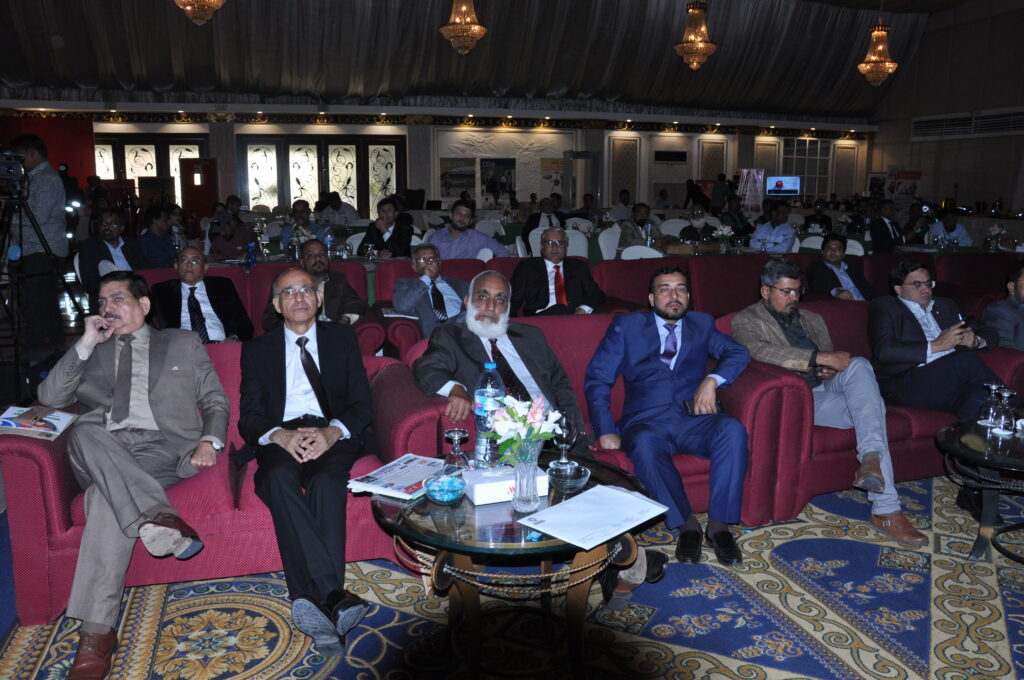Speakers lament firefighting system of Karachi weakest in country despite being most populous city
Speakers of a convention lamented that the firefighting system of Karachi has been the weakest in the entire country despite it being the most populous city as the concerned authorities have to do much on an emergency basis to rectify this situation. These views regarding the frail firefighting system of Karachi along with the call to strengthen it were expressed at the 8 th Fire Safety & Security
Convention-2018. The convention held in early November, 2018 at a hotel of Karachi was organized by the National Forum for Environment & Health (NFEH) in collaboration with the Fire Protection Association of Pakistan (FPAP). The speakers of the convention further lamented the situation that resources and equipment of Fire Brigade of Karachi had lately depleted to such an alarming extent that it could cover merely 10 per cent portion of the city. They were of the viewpoint that Fire Department of the Karachi Metropolitan Corporation should be upgraded on a war-footing basis so to make it fully capable of tackling more than one full-scale fire emergencies in the city at a time. Sindh Minister for Environment & Climate Change Taimur Talpur who was chief guest on the occasion assured audience of the convention that the Sindh government had the complete realization of the situation that much had still to be done to overcome serious deficiencies of the fire-fighting system of the city. The provincial Environment minister said that Sindh government was fully cognizant about massive loss of human lives, damage to public, and private properties due to recurring fire incidents in the city as such tragedies did occur due to the weak firefighting system. He said that relevant provincial authorities were fully aware of the fact that Sindh government was ultimately responsible for ensuring fire protection in the province. He said that Sindh chief minister had duly given the task to provincial Local Government minister to beef up firefighting systems of municipal agencies across the province.
He said that provincial government in this regard had started providing necessary equipment to fire brigades of different municipal agencies in the province to upgrade them. The process of provision of resources and equipment to fire brigades across the province was continuing though it was taking considerable time as the Chairman of Pakistan Peoples Party ruling in the province had asked the Sindh government to ensure complete transparency in the procurement process initiated for the purpose.
He said that present Sindh cabinet was fully determined to make improvement in the areas of governance related to such important civic issues of the province as the incumbent cabinet members were handpicked by the PPP chairman as they would simply be changed or replaced in next three to six months in case they failed to deliver to the masses. Commissioner Karachi Iftikhar Ali Shallwani said that much time had not passed since he had assumed the office of commissioner as immediately
afterwards he had held a meeting to devise a joint and integrated firefighting strategy in the city after involving all the relevant civic and government agencies working there. He said that up to 45 fire tenders were available in Karachi at a given time to deal with any fire emergency if firefighting resources of different civic and land owning agencies in the city were combined together. He said that proper training sessions were required to be conducted to enhance capacity of firefighters of the city so as to match the professional capabilities and training of their counterparts in the developed world. The city’s commissioner informed the audience that the work had been started to develop a firefighting cellular phone application for Karachi as it would provide real time information and data about fire brigade units and fire tenders including their actual positions on different roads of the city. He acknowledged that coordination had to be enhanced among different civic and land owning agencies of the city for an effective and integrated firefighting strategy for Karachi. Also speaking on the occasion, FPAP President Imran Taj said the field of fire protection had evolved and lately became a full-fledged professional discipline as resultantly a number of job opportunities had been created in corporate and industrial sectors related to the areas of Health, Environment, and Safety (HSE). He said that study courses were being conducted both in the regional countries and globally to enhance the professional capabilities of the officials related to the field of HSE. He said that industries and businesses in Pakistan had been lately compelled to establish their in-house HSE departments as without such an initiative they could not do trade and business with countries of the developed world. Tariq Moen, FPAP Secretary, said that people and businesses in Pakistan should realize that the fire brigade was the last line of defence whenever someone had to deal with any fire emergency as otherwise commercial, residential, and industrial buildings had to have their own fire safety measures on a compulsory basis to timely tackle any fire incident at their premises. He said that besides availability of fire extinguishers and fire alarm systems in both commercial and residential buildings especially the high-rises, their occupants should also know the drill to evacuate in emergency their workplace or homes in case of any fire incident. He said the FPAP had lately surveyed eight multi-storied commercial buildings on I.I Chundrigar Road in Karachi as emergency exits had been found in only two buildings. The situation has been much better on Sharea Faisal where construction of buildings is relatively newer as up to 40 per cent high-rises on main thoroughfare of Karachi had emergency exits. Fawad Barry, CEO of Haseen Habib Trading providing fire safety consultancy in the city, lamented that in the decades of 1990s, there were around 70 fire engines available to Karachi Fire Brigade whose number had now been reduced to just over a dozen. He said that budget of millions of rupees had been spent in the provinces of Punjab and Khyber Pakhtunkhwa to develop and upgrade Rescue 1122 service there but no such effort had been made in Karachi or elsewhere in
Sindh.
He said that Fire Safety Provisions-2016 as part of the Building Code of Pakistan should be implemented in the entire country to make it lawfully binding upon constructors of new buildings to include all necessary fire safety measures for protection of lives of their occupants. He said that Pakistan on an average had to suffer over 16,000 deaths, injuries to between 1,75,000 to 200,000 people, and property damage to the tune of Rs 04 billion every year alone on the account of fire emergencies as due safety measures had to be taken to prevent such tragedies in future.
He said that in a city like Karachi, a composite emergency helpline service should be initiated that could immediately dispatch police help, rescue personnel, or fire brigade to attend any sort of emergency in any part of Karachi.
Junaid Esmail Makda, president of Karachi Chamber of Commerce & Industry, in his remarks said that Sindh government and KMC were required to do more efforts to beef up arrangements of fire protection in the city. He said that a committee having due representation of associations of different industrial estates in the city had to be established to inspect and check firefighting capabilities and arrangements at different industrial units of the city.
NFEF President Naeem Qureshi, Engineer Nadeem Ashraf, project head of Fire Safety& Security Convention, Ahmad Al Fasfous, SFFECO Global & Hassan Qureshi, Head of Admin and Security, Consul General Switzerland also spoke on the occasion.
Some 30 companies, both local and multinationals, were also given awards on the occasion for their excellent performance in the field of fire safety and security to ensure protection of their physical assets, material, and human resource alike.




